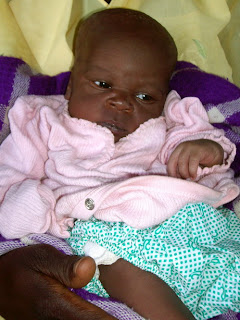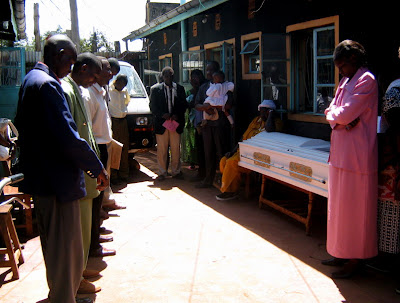 Malava villagers gather around for a Tangawizi tea promotion
Malava villagers gather around for a Tangawizi tea promotionMalava is such a small village in Kenya that it doesn’t appear on most maps, but for it’s size there is surprisingly a lot going on. When I wake up in the morning it is not to the startling sound of a buzzing alarm clock, but rather the friendly sounds of the countryside. My rooster crows from the courtyard, a cow moos from the field behind my house, and a tractor drives by in the distance. For a moment, as I come out of my dream, I could be in any small town in America, but then I hear the sounds of people. The people walk by my house on a narrow footpath to the church and I hear them talking back and forth to each other. Their voices are familiar, but the language they speak can’t be understood. They are speaking Kiluyha (KEE-LOO-YAH), the language of the local tribe, the Luyha (LOO-YAH) tribe. “Oh yeah,” I remind myself, as I open my eyes and yawn, “I’m in Kenya.”
 Men sell chickens from a basket on their bicycle
Men sell chickens from a basket on their bicycleOn my way to the St. Julie Centre on Wednesday’s mornings, just before I cross the main tarmac road, I walk through numerous vendors selling chickens from baskets on the backs of their bicycles. The chicken’s legs are tied so they won’t run away and many of them cry out and flap their wings desperately as they are held upside down. Some are also lying in piles on the ground and I look them over briefly as I walk by. I try not to look too long or I will be hounded by the vendor to purchase one. I think to myself, I am probably the only person in all of Kenya that keeps chickens for a pets.
 The Posho Mill is used to grind maize into flour
The Posho Mill is used to grind maize into flour This boy heads for the market to sell greens
This boy heads for the market to sell greensAs I cross the road, matatus are quickly stopping to let the passengers off while others are scrambling to get on. There is always a long line of boda bodas (bicycle taxis) on this road. They call out to me as I walk passed, offering to take me to work by bicycle for only 10 Ksh ($0.07). Close by there is a place where bicycle mechanics are hard at work. I wave to them and continue on my way. Some villagers are carrying small baskets or large heavy sacks of maize to the posho (POH-SHOW) mill. The posho mill is a place to bring dried maize to be ground by a machine into flour for making ugali. Ugali is the main food of many Kenyans and so the posho mill is a busy place that does a lot of business. For 4 Ksh ($0.03), one gorogoro (coffee can) of maize can be ground into flour. Other villagers walk barefoot along the rough dirt roads carrying baskets of fruit on their heads to the market to sell. Some also carry jugs of milk or bushels of greens.
 Malava kiosk
Malava kiosk Barber shop and music store
Barber shop and music store Babadogo Discount Shop
Babadogo Discount ShopTo my right I pass a number of kiosks (wood stands selling fruit and other items) and Malava’s only music store, which most of the time functions as a kinyozi (barbershop). To my left I pass the Babadogo Discount Shop which sells soda, bread, milk, eggs, sugar, margarine, matches, batteries, padlocks, brooms, and more. Both advertise that mobile charging and prepaid phone cards are available. While most villagers do not have electricity in their homes, many own mobile phones and come to the shops to buy airtime and pay to have their phones charged.
 A poor man in Malava
A poor man in MalavaOn my way to work, many days I see at least one mentally ill man or woman that looks so much poorer than all of the rest of the villagers. In general, the people of Malava are poor, but because they all live at about the same standard, only the incredibly poor stand out. These people appear to be homeless and wear dirty, tattered clothes with many odds and ends stuck into the pockets. One woman walks through the marketplace topless and dances to the music on a radio while one man talks nonsense to anyone who passes by. They have become a nuisance to some, but never to me. They both always greet me kindly when I see them on the road.

Fried tilapia
 This man sells roasted maize by the roadside
This man sells roasted maize by the roadsideOn the weekends there is always something happening. On Fridays the main attraction is the new Malava market. The original market along the tarmac was moved to a nearby location just up the road from the St. Julie Centre. This new location has a brick and concrete enclosure that provides shelter from the traffic, sun, and rain. It also offers clean latrines and showers for only 10 Ksh ($0.07). But most villagers save their money by showering from a bucket at home and use the bushes and trees for a “short call” (nature’s call #1). Since most people in Malava do not own televisions, sometimes on market day a large food company will send a promotional team to entertain the crowd in order to advertise it’s products. The Tangawizi tea company team comes in a bus that converts into a stage. They set up a sound system and play music and dance for the crowd. On the roadside, people are selling fried tilapia and roasted maize. They always ask me if I would like to buy either of them, but unfortunately I do not care for fish and the roasted maize is too hard for me to eat.
 Villagers dance at the crusade
Villagers dance at the crusadeOn Saturdays and Sundays nearly all of the many churches in Malava are active. While St. Teresa is the only Catholic parish, there are many Protestant churches. The more prominent ones are the African Church of the Holy Spirit, the Friends Church, and the Salvation Army Church. One Pentecostal church sets up a stage for a crusade. They sing gospel songs and dance while they invite the villagers to join in. Between performances a charismatic preacher shouts into a microphone giving them the hard gospel message. The preacher’s voice can be heard clearly from my house, but because I cannot understand what he is saying his forceful tone only makes me laugh. To me his strong voice sounds like he is challenging someone to a wrestling match.
 The New Honey Drops Hotel
The New Honey Drops Hotel Malava Supermarket
Malava Supermarket The trees in Malava forest are home to monkeys and baboons
The trees in Malava forest are home to monkeys and baboonsOn the weekends I go early to the New Honey Drops Hotel for mandazi and stop off at the Malava Supermarket for milk to make chai tea. I usually spend the morning in the house, but in the afternoons I may take a walk up passed the landmark Total station to the Malava forest. The Malava forest has many interesting species of trees that are inhabited by monkeys and baboons. The monkeys usually remain in trees, but the baboons will walk along the roadside with the people. Sometimes they will chase a woman carrying a basket of fruit on her head. They are normally harmless animals, but I am told when one of them feels threatened they will all come together and can viciously attack.
 The Imax Cinema
The Imax CinemaOn my way back from the forest I pass the Imax Cinema to see what is showing. A chalkboard outside lists a schedule for what is playing. Usually there are Nigerian movies during the day, but in the evening the schedule is full of English Premier soccer matches. Unlike in the United States where “Imax” means stadium seating, digital theatre sound, and an eight-story screen, in Malava “Imax” means a 19-inch color TV, no remote.
 The Wornder Kutz Kinyozi
The Wornder Kutz Kinyozi (barber)
Before I head home I stop at the Wornder Kutz Kinyozi (barber) for a hair cut. I believe the sign is supposed to say “Wonder Kutz” but because many of the older villagers cannot read, spelling is not important. Most Kenyans do not use scissors to cut hair, they simply use electric clippers to shave their heads clean. And because there is not much technique involved most barbers learn on the job. The barber shaves my head, but I am careful to give instructions for him to leave a little stubble. When he is finished he wipes the back of my neck with a brush made of animal fur and I pay him 10 Ksh. As I leave I again look up at the sign and think, “I pay for the haircut, but the laughs are free.” This, of all, is how I have chosen my barber.
When I reach home the evening is beginning to set in and I am thinking about what to make for dinner. I fetch some water and cook some rice and look out at a picture perfect sunset. It is the perfect ending to another enjoyable day in my small village of Malava.
 A picture perfect sunset
A picture perfect sunset























































